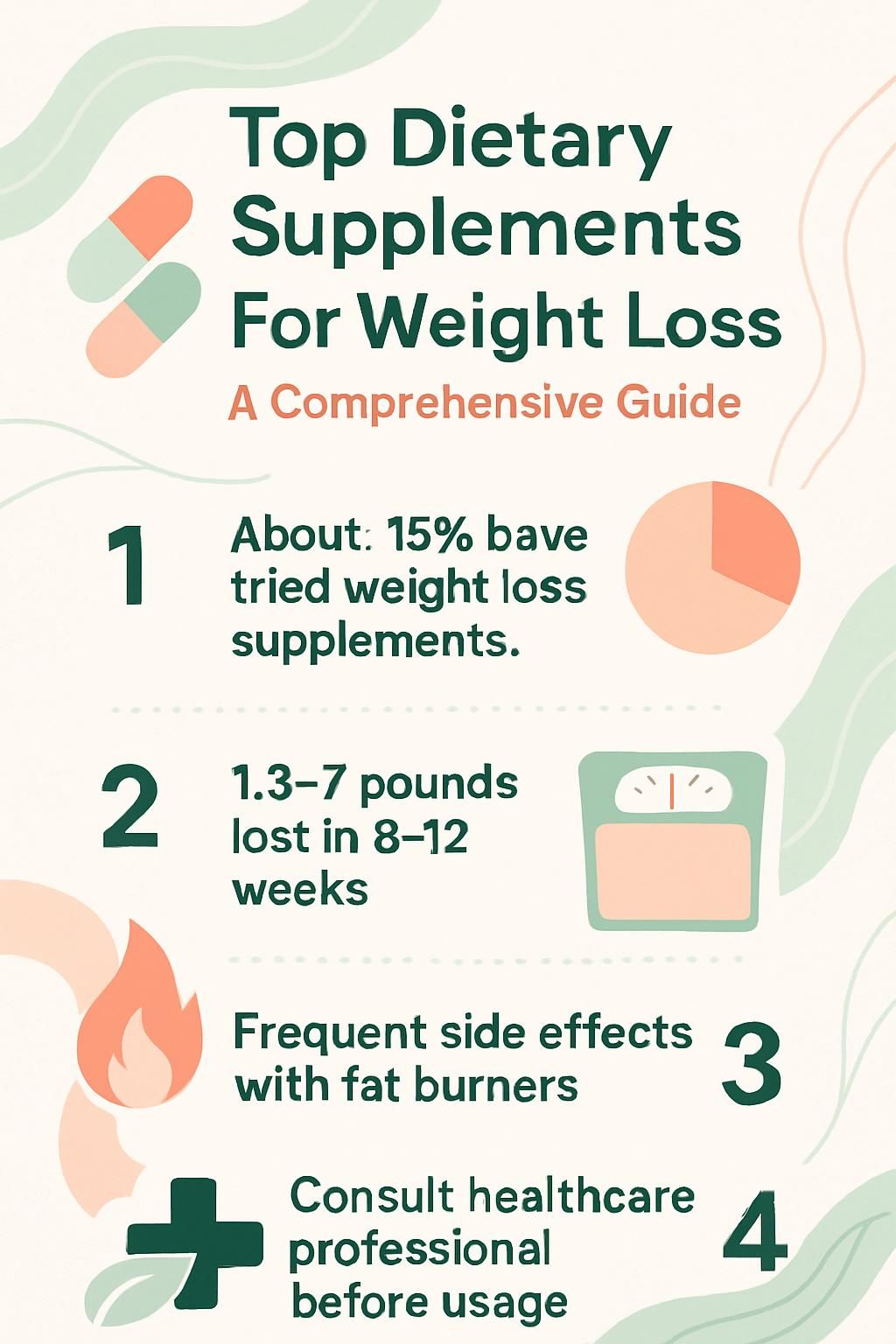Top Dietary Supplements For Weight Loss: A Comprehensive Guide
Our Nutrition Assistant AI Suite will transform your body. You will lose fat, get toned, and build muscle. Gain confidence and optimal health.
Losing weight can feel confusing, especially with so many products on the shelf. About 15 percent of adults in the United States have tried a weight loss supplement, yet many products lack strong proof or clear safety data. This guide breaks down how supplements for weight loss work, what the evidence shows, and how to use them wisely with diet and exercise.
You will learn about popular ingredients like green tea extract and glucomannan, what side effects to watch for, and how to read labels. The goal is a clear plan that matches your health needs and your daily routine.
Use the notes below to decide which options deserve a closer look.
Key Takeaways
- About 15% of U.S. adults have tried weight loss supplements, and most products do not require Food and Drug Administration review for safety or effectiveness before sale.
- Green tea extract and glucomannan show modest weight loss in studies, about 1.3 to 7 pounds in 8 to 12 weeks.
- Caffeine-heavy products and other stimulants, such as ephedra or synephrine, often cause insomnia, rapid heartbeat, and stomach issues.
- Clear labeling matters. Hidden or extra ingredients can trigger harmful reactions or interact with medicines and health conditions.
- Talk with a healthcare professional before starting any supplement. Long-term safety data are limited for many products.

What Are Weight Loss Supplements and How Do They Work?

Think of supplements as tools. They can support your plan, but they do not replace it.
What are dietary supplements for weight loss?
Dietary supplements for weight loss are products you swallow, such as tablets, capsules, powders, or liquids. Common ingredients include vitamins, minerals, herbs like bitter orange or garcinia cambogia, fiber sources such as glucomannan, and stimulants like caffeine from green coffee beans or tea extract. Some aim to increase calorie burn, some reduce appetite, and others block the absorption of fat or carbs.
Most weight management products are sold over the counter without a prescription. The Food and Drug Administration does not approve these products for safety or effectiveness before they reach stores. A short example from my college years, green tea extract curbed evening snacking for me, but a second capsule made me feel jittery.
How do they work?
Most weight-loss supplements use three main approaches. First, they raise energy use through thermogenesis, which means your body burns more calories. Second, they reduce hunger or cravings. Third, they lower absorption of nutrients, such as fat or starch.
Green tea extract and caffeine can boost metabolism and heart rate, which may increase daily calorie burn. In several studies, people taking caffeine lost more weight over 12 weeks than those on a placebo. Fibers like glucomannan expand with water in your stomach, helping you feel full and eat less. Carb blockers reduce the breakdown of some starches, so fewer sugars enter your blood after high-carb meals.
Some supplements may lower calorie intake by curbing appetite and limiting nutrient absorption.
Short-term trials often show an added loss of 2 to 10 pounds beyond diet alone. Results depend on the product, your health conditions, and how well you follow a healthy eating plan and regular activity.
Key Factors to Consider Before Choosing Weight Loss Supplements
Smart choices begin with safety, honest labels, and credible research. Your health history should guide every step.
What safety risks and side effects should I know?
Common side effects include nausea, vomiting, diarrhea, constipation, abdominal pain, anxiety, and insomnia. Stimulants, especially caffeine, can raise your heart rate and blood pressure and may disrupt sleep. Synephrine and ephedra have been linked to spikes in blood pressure and heart problems. The FDA banned ephedra due to safety risks, but related stimulants still appear in some products.
High doses of green tea extract have been linked to liver injury in rare cases. I once tried a popular tablet for weight control and felt headaches and jitters after a week. Lowering the dose stopped those symptoms. People with high blood pressure, kidney disease, or other conditions should talk with a healthcare professional before use.
Clear labels help you avoid hidden substances and risky combinations. Read the ingredient panel closely every time.
Why is ingredient transparency important?
Knowing every ingredient gives you control. Transparent labels let you spot allergens, artificial colors, and undisclosed stimulants like extra caffeine. You can also check for research-backed compounds, such as green tea extract or certain fibers that have data to support weight reduction.
Two similar-looking products can contain very different doses and fillers. I once compared two pills side by side and found the fiber amounts and excipients were not even close. People with type 2 diabetes need special care, since some sugars and bulking agents affect blood sugar level.
Clear labeling helps you avoid harmful reactions and match a supplement to your needs, notes Dr. Linda Katz of the FDA’s Center for Food Safety and Applied Nutrition.
How can scientific studies and clinical trials guide me?
Studies and clinical trials show what works, what does not, and what side effects to expect. For example, green tea extract contains caffeine and catechins, which may increase fat burning when paired with diet and exercise. Trials measure average weight changes over a set period, often 12 weeks, and compare them to placebo groups.
I tested an appetite-focused supplement after reading the published data. The results were modest, just as the studies suggested, a small drop in hunger rather than quick changes in muscle mass or cholesterol. Reliable trials track side effects such as insomnia with higher caffeine intake or stomach issues with high-fiber tablets.
Look for systematic reviews from sources like the Office of Dietary Supplements or the National Center for Complementary and Integrative Health. These help you judge expected benefits, safe dose ranges, and common risks.
How do personal health conditions affect supplement choice?
Your health profile shapes your best options. If you have diabetes or insulin resistance, some ingredients like chromium might help with glucose control, while others could disrupt it. People with high blood pressure should avoid stimulants, such as caffeine blends and ephedra, since they can raise heart rate and blood pressure.
Prescription drugs can interact with supplements. I considered an anorectic-style tablet while taking thyroid medicine, and my doctor warned me about irregular heartbeat risk. Review labels carefully if you have allergies or digestion problems. Age, medications, and conditions such as obesity or kidney disease all affect safety and results.
Popular Categories of Weight Loss Supplements
Supplements fall into several groups. Each targets weight in a different way.
What are fat burners and how do they help?
Fat burners are supplements that try to help your body use fat as energy. Many include caffeine, green tea extract, or similar plant-based stimulants. These ingredients may increase metabolism and calorie burn during daily activity and exercise. Some formulas also try to reduce fat you absorb from food.
A friend used a green tea extract product for 12 weeks while following a balanced diet and moving more each day. She felt more energized and saw better progress than without the supplement.
How do appetite suppressants work?
Appetite suppressants affect the signals that control hunger. Fibers such as glucomannan absorb water and help you feel full, so you may eat fewer calories at meals. Some products influence hormones or brain messengers that cue fullness.
Prescription options act on neurotransmitters like serotonin. Over-the-counter products often include caffeine, magnesium, or certain plant extracts. Research on long-term weight loss is limited, so discuss your plan with a healthcare professional before use.
What are carb blockers and their benefits?
Carb blockers, also called starch blockers, reduce the breakdown of some carbohydrates into sugar. With fewer carbs absorbed, your blood sugar may rise less after high-carb meals. White kidney bean extract is a common ingredient.
Some 12-week studies report an extra 2 to 5 pounds of weight loss compared with placebo. In community programs I have worked with, people did better when they used carb blockers along with diet changes and regular exercise, not as a stand-alone pill. Mild gas or stomach upset can occur if you consume many carbs while using these products.
What are thermogenic supplements?
Thermogenic supplements aim to raise your metabolism so you burn more calories, even at rest. Many include caffeine, green tea extract, or capsaicin from chili peppers. Research shows caffeine can raise energy use for several hours, while green tea may help your body use fat during exercise.
These products are sold as tablets or powders. Some users see small weight changes when pairing them with diet and training. Talk with a healthcare provider before you start, since stimulants can cause a rapid heartbeat or digestive upset.
How do fiber-based supplements aid weight loss?
Fiber supplements help you feel full, which can lower calorie intake. They absorb water and slow digestion. Glucomannan, a konjac root fiber, works well when taken with water before meals. In one study, participants lost up to 5.5 pounds in eight weeks.
Many people also try psyllium husk. I used fiber capsules with breakfast and noticed fewer snack cravings while following the Dietary Guidelines for Americans. Fiber may also help steady blood sugar and support gut health.
Green Tea Extract Benefits and Drawbacks
Green tea extract is common in weight management products. It can aid fat burning, but it is not risk free.
What are the features and benefits of green tea extract?
Green tea extract contains catechins, such as EGCG, and natural caffeine. These compounds can increase metabolism and fat use during exercise. Some trials show greater reductions in body fat for users compared with nonusers.
Green tea extract also offers antioxidant support, which may lower oxidative stress. Some studies tie it to healthier cholesterol levels. At recommended doses, it is considered safe for most healthy adults.
What are the pros and cons of green tea extract?
- Antioxidants may support heart health while you work on weight reduction.
- Thermogenic effects can raise fat burning during workouts.
- Trials show modest weight changes, about 1.3 to 1.6 kg over 12 weeks.
- Caffeine can raise alertness and energy, but may disrupt sleep or raise heart rate.
- Some people report headaches or stomach upset with regular use.
- High doses have been linked to liver issues. Watch for yellowing skin or dark urine.
- Product quality varies. Check labels for exact catechin and caffeine amounts.
- Supplements are not reviewed by the FDA for safety or purity before sale.
- People with health conditions or those on medication should talk with a clinician first.
Garcinia Cambogia: Uses and Considerations
Garcinia cambogia is often marketed for appetite control. The effects tend to be small and vary by person.
What are the features and benefits of garcinia cambogia?
Garcinia cambogia rind contains hydroxycitric acid, or HCA. HCA may help reduce appetite and may slow fat production. Some studies show small weight reductions when added to a weight management plan. In one clinical trial, those taking HCA lost about 2 pounds more over two weeks than the placebo group.
Formulas often combine garcinia with ingredients like chromium or caffeine. That mix may support different goals, such as appetite control and energy. When I tracked calories and exercise, adding garcinia helped me feel fuller after meals and cut between-meal snacking.
What are the pros and cons of garcinia cambogia?
- Several small trials report modest weight loss, but the effect is often short term.
- Some users feel less hungry, which can lower daily calorie intake.
- HCA might influence enzymes involved in fat production.
- Side effects can include stomach discomfort, headache, or nausea. Rare liver issues have been reported.
- Quality varies. Some labels lack transparency or include fillers.
- The FDA does not approve garcinia for treating obesity.
- Long-term safety is unclear due to limited large clinical trials.
Next, see what to expect from CLA if you are comparing options for body composition support.
Conjugated Linoleic Acid (CLA) Overview
Conjugated linoleic acid is a fatty acid found in meat and dairy. It is studied for potential changes in body fat.
What are the features and benefits of CLA?
CLA supplements often come from safflower oil. Many people use them to reduce body fat while keeping lean mass. Research suggests 3 to 6 grams per day for about 12 weeks may produce small drops in body fat percentage.
Results can improve when you pair CLA with a healthy eating plan and regular activity. Some users report better training energy. Adding CLA to my routine encouraged me to stay active and watch how foods affected my energy across the day.
What are the pros and cons of CLA?
- Some studies show small fat loss in adults with overweight, but results vary widely.
- You can get CLA from foods or a supplement, which offers flexibility.
- Animal research suggests metabolism benefits, but human data are mixed.
- Side effects can include nausea, diarrhea, fatigue, or stomach upset.
- High doses may change liver enzymes or raise insulin resistance markers in some people.
- Supplements are not approved by the FDA before sale, so verify ingredient transparency.
- Long-term safety data are limited. Short-term use under medical guidance is common.
- Changes in body composition are usually modest compared with structured exercise.
- If you have diabetes or metabolic concerns, speak with a clinician first.
Glucomannan: What You Should Know
Glucomannan is a natural fiber that swells with water. It can help you feel full and support calorie control.
What are the features and benefits of glucomannan?
Glucomannan comes from the konjac root. It absorbs water, expands in your stomach, and slows digestion, which can help reduce snacking. Some studies show improvements in blood sugar and cholesterol when used with a balanced diet.
During one weight management plan, I noticed fewer cravings when I used glucomannan before meals. It is very low in calories and acts as a prebiotic fiber, which supports gut bacteria and digestive health.
What are the pros and cons of glucomannan?
- Helps you feel full, which can lower calorie intake.
- Studies report modest weight loss, about 5 to 7 pounds over several weeks with diet changes.
- Supports regularity due to high fiber content.
- Available as capsules, powders, and drink mixes.
- May cause bloating or gas, especially at higher doses.
- Always take with plenty of water to avoid swallowing problems.
- Rarely, fast or excessive intake can cause choking or blockage.
- Evidence for benefits past 12 weeks is limited.
- Can affect how some medicines are absorbed. Ask your clinician first.
- Not advised for children, pregnant people, or those with swallowing issues without medical guidance.
Caffeine-Based Supplements Explained
Caffeine can raise energy, alertness, and calorie burn. Used carefully, it may help you train harder and stick with your plan.
What are the features and benefits of caffeine-based supplements?
Caffeine increases thermogenesis, which is your body’s heat production, and can raise metabolic rate for several hours. Many people use it to boost focus and workout performance. You can find caffeine in pills, powders, and ready-to-drink products.
A typical serving ranges from 100 to 300 milligrams per dose. Before cardio, I used a moderate capsule and noticed better endurance with less perceived effort. Regular use can support weight management when combined with diet and exercise.
| Product Type | Average Caffeine (mg) |
|---|---|
| Pre-workout powder | 150-250 |
| Energy capsule | 100-200 |
| Ready-to-drink beverage | 80-160 |
People who rarely drink coffee often feel stronger effects at lower doses than daily coffee drinkers.
What are the pros and cons of caffeine-based supplements?
- Quick energy can help you exercise longer and stay active.
- Metabolic rate may rise by 3 to 11 percent for several hours.
- Fat use often increases, especially with pre-workout timing.
- Mild appetite reduction can help you eat fewer calories.
- Focus and alertness may improve when used early in the day.
- They are easy to find and usually cost less than many alternatives.
- High doses can cause rapid heartbeat, jitters, headaches, or stomach issues.
- Late-day use can disturb sleep, which can affect mood and recovery.
- Tolerance builds over time, so benefits may fade as risks increase.
- People with heart disease or anxiety may react poorly, even to small amounts.
- Starting with a half serving helped me track my response and avoid jitters.
Emerging Trends in Weight Loss Supplements
New products focus on gut health and plant-based blends. The trend is to support your whole routine.
What role do postbiotics and probiotics play?
Probiotics are live bacteria that help balance the gut. Certain strains may aid fat loss and appetite control. In several trials, Lactobacillus gasseri and Bifidobacterium breve users lost up to 8% of belly fat in twelve weeks.
Postbiotics are compounds made by probiotics during fermentation. They may reduce inflammation or affect how your body stores fat. I added a daily probiotic last year and felt more comfortable after meals within two weeks.
What plant-based and vegan options are available?
Several vegan-friendly supplements support weight goals. Glucomannan is popular, since it swells with water and helps you feel full. Studies suggest around 3 grams per day can support weight loss with a balanced diet. Green tea extract is another plant-based choice that may raise fat burning with its catechins and natural caffeine.
Some people try garcinia cambogia for appetite control. Fiber mixes from chia or flax also add bulk and slow digestion. If you follow a strict vegan diet, scan labels for hidden animal ingredients.
How Supplements Fit Into a Healthy Lifestyle
Supplements can help, but healthy habits do the heavy lifting.
Why are diet and exercise important for weight loss?
A healthy diet gives your body nutrients while helping you control calories. Vegetables, fruits, lean protein, and whole grains increase fullness and reduce cravings. Regular exercise raises your metabolism and burns calories. A brisk 30-minute walk or jog can use 200 to 400 calories.
Combining nutritious meals with activity creates a calorie deficit, which is needed to lose weight. Tracking your meals and setting realistic workout goals can keep you on course. Many people report more energy and better mood after just a few weeks.
How should supplements be used as an additional tool?
Use supplements to support diet and exercise, not to replace them. Choose products that match your goals, read labels for doses and warnings, and discuss new products with your healthcare professional if you take medications or have health conditions.
Follow serving directions, start low, and track your energy, sleep, and any side effects. Make steady habits your priority. Supplements can assist, but your daily choices drive most weight change.
Frequently Asked Questions About Weight Loss Supplements
Here are clear answers to common questions before you choose a product.
Are weight loss supplements approved by the FDA?
No. The FDA does not approve dietary supplements the way it approves prescription drugs. Companies can sell products without proving safety or effectiveness first. If a product causes harm, the FDA can act after the fact. I once bought a carb blocker online and later learned similar products carried warnings about digestive issues.
Search for independent testing, and talk with your clinician before you try a new supplement.
Can supplements support long-term weight loss?
Supplements alone rarely lead to lasting results. Ingredients like glucomannan or green tea extract can help with appetite or fat use, but the effects are modest without diet and exercise. One study reported less than 2% body weight change in three months when people used supplements without changing lifestyle.
You may see better results when you combine supplements with portion control and daily activity. I had the best progress when I paired fiber supplements with walks and simple meal planning under medical guidance.
Who should avoid taking weight loss supplements?
People with conditions like diabetes, heart disease, or high blood pressure should skip these products unless a doctor approves them. Do not use them if you are pregnant or breastfeeding. Children and teens under 18 should not take weight loss supplements.
Supplements can interact with prescriptions and may cause side effects, including headaches, dizziness, or stomach problems. I once felt lightheaded after using a caffeine-heavy product during exam week, which taught me to check labels and start with small doses. People with allergies should scan for alternate names of problem ingredients.
How to Use Weight Loss Supplements Safely
Protect your health while you work toward your goals. A few simple steps go a long way.
Why consult a healthcare professional before use?
A clinician can review your history and medications to see if a product is safe. Many supplements interact with drugs or raise risks in conditions such as hypertension or diabetes. I tried green tea extract once without asking my doctor and felt jittery due to caffeine sensitivity.
Professional input helps you avoid side effects and choose products with better quality control and evidence.
Why start with a low dose?
Starting low lets your body adjust. Stimulants and fibers can cause jitters, nausea, headaches, or stomach upset if you take too much too fast. A gradual increase helps you notice reactions early and avoid larger problems like changes in heart rate or blood pressure.
If you feel unwell after a small dose, stop and check in with your healthcare provider. Follow package directions closely.
How to monitor for side effects?
Track your symptoms daily. Note headaches, stomach pain, changes in heart rate, mood shifts, sleep problems, or skin rashes. Write the time and dose so patterns are easy to spot.
Contact your doctor if symptoms persist or worsen. Keep product labels handy for review. Seek urgent care for signs of an allergic reaction, such as swelling of the face or trouble breathing.
Conclusion
Choosing a dietary supplement for weight loss works best when you pair it with nutritious meals and regular movement. Ingredients such as green tea extract and glucomannan may add small benefits, especially for appetite control and calorie burn. Check labels, consider the evidence, and match each product to your health profile.
Talk with a healthcare professional before you start, especially if you take medication or have a medical condition. With careful use and smart habits, you can support steady progress and protect your health.
Information in this guide is educational and not a substitute for medical advice. Sources: National Institutes of Health Office of Dietary Supplements, National Center for Complementary and Integrative Health, and peer-reviewed clinical trial data.
FAQs
1. What are the most effective dietary supplements for weight loss?
Clinical studies highlight green tea extract, conjugated linoleic acid, and soluble fiber as some of the top choices for supporting weight management. Research shows these options may help increase metabolism or reduce appetite when combined with a healthy diet and exercise plan.
2. Are dietary supplements safe to use for losing weight?
Most over-the-counter products like caffeine-based pills and fiber blends have been tested in adults and show few side effects at recommended doses. However, certain ingredients can interact with medications or cause health risks if misused; always consult a healthcare provider before starting any supplement.
3. How do I know if a supplement is backed by science?
Look for brands that cite peer-reviewed research or clinical trials on their labels or websites. For example, one study published in The American Journal of Clinical Nutrition found that participants taking green tea extract lost more body fat than those who did not take it.
4. Can personal experience guide my choice of supplements?
Personal results vary widely based on genetics, lifestyle habits, and overall health status. After trying glucomannan capsules under medical supervision last year, I noticed reduced cravings but only modest changes in my weight compared to regular exercise alone.
Summary:
Top dietary supplements such as green tea extract and soluble fiber may support weight loss when used responsibly alongside healthy habits. Always check scientific evidence before choosing a product; individual experiences can differ due to many factors including biology and daily routines.







